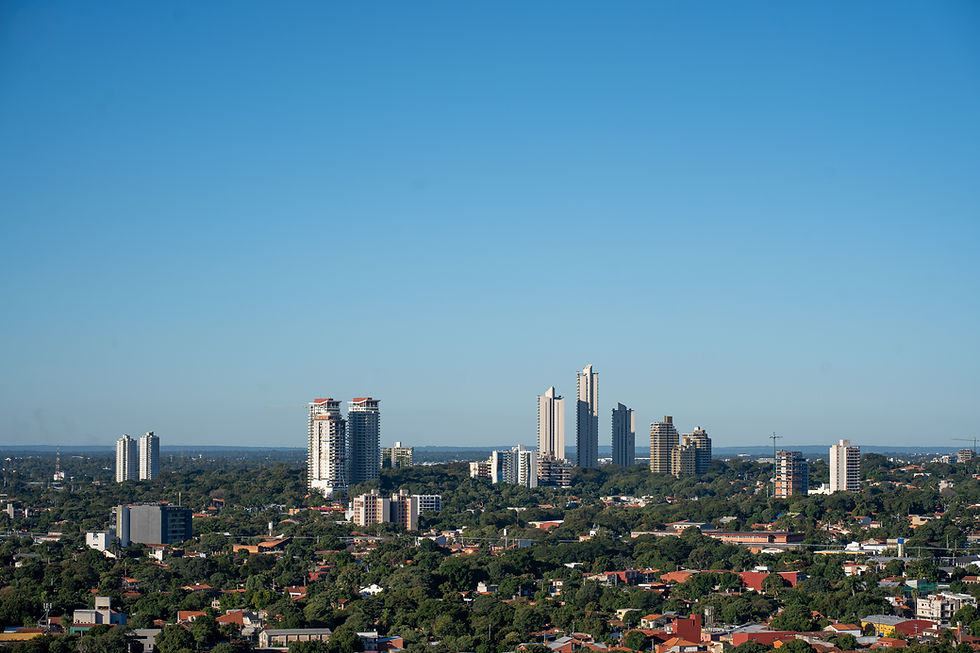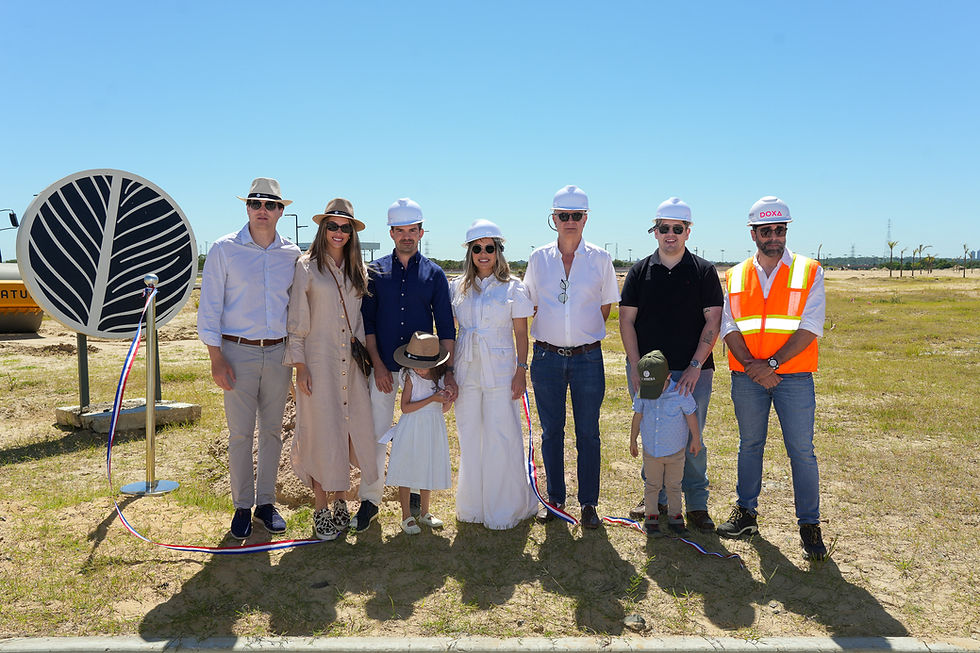Paraguay, in the Global Spotlight: Stability, Low Tax Burden, and Sustained Growth
- Carlos E. Gimenez

- May 6, 2025
- 5 min read
Updated: May 10, 2025
In recent years, Paraguay has moved from being a peripheral market to one of the most attractive destinations for foreign investment in South America. Its macroeconomic stability, competitive tax regime, and abundant natural resources have captured the attention of analysts, international media, and institutional investors, positioning the country as a strategic option for long-term business development.

According to data from the Ministry of Industry and Commerce (MIC), in 2024 alone, Paraguay attracted more than 1,100 companies from 55 countries, with Argentina, Brazil, Bolivia, the United States, and Chile being the main sources of investment. This figure is not isolated: according to the Central Bank of Paraguay, foreign direct investment (FDI) reached USD 9,966.6 million at the end of the third quarter of 2024, representing a 4.1% increase compared to the same period last year.
This influx of capital is largely driven by the strength of the Paraguayan economy. In July 2024, Moody's awarded the country investment grade status for the first time in its history, with a Baa3 rating and a stable outlook. This milestone was widely celebrated, as it represents greater confidence in global financial markets and facilitates access to credit at lower rates for the country and its companies.
After being the fastest-growing country in the subregion in 2024, Paraguay is expected to remain among the most dynamic economies this year. The 3.8% growth forecast by the IMF for 2025 would place it behind only Argentina, which is expected to experience a 5.5% economic expansion this year.
One of Paraguay's main distinguishing features compared to its neighbors is its macroeconomic stability. While other economies in the region face high inflation and fiscal crises, Paraguay has maintained prudent monetary policy, moderate inflation, and controlled public debt.
Furthermore, the country has one of the most competitive tax regimes in Latin America. The Corporate Income Tax (CIT) rate is 10%, one of the lowest in the region. Added to this is a 10% Value Added Tax (VAT), also considered among the lowest in Latin America, which reduces the tax burden on consumption. Paraguay's overall tax structure generates a total tax burden of around 11.4% of GDP, one of the lowest in the continent, providing greater scope for business profitability.
Paraguay also has clear and accessible incentive policies, such as Law 60/90, which grants tariff and tax exemptions to domestic or foreign investment projects that meet certain strategic requirements. This law allows companies to import capital goods, raw materials, and inputs without paying tariffs or VAT, thus encouraging the establishment of industries and local productive development. There are also special regimes such as free trade zones, where companies can operate with significant tax benefits, including full exemption from national taxes, provided their production is destined for export.
Likewise, there are special regimes such as free trade zones, where companies can operate with significant tax benefits, including full exemption from national taxes, provided their production is destined for export. This combination of low tax burden, regulatory stability, and investment incentives positions Paraguay as an ideal environment for medium- and long-term projects, especially in sectors such as manufacturing, logistics, agribusiness, and technology.
In parallel with the boom in productive investment, Paraguay is also beginning to position itself as an attractive destination for digital nomads and expats. Its favorable tax regime, low cost of living, economic stability, and growing digital connectivity have captured the attention of remote workers and independent professionals seeking a safe and accessible environment in South America. Asunción, in particular, has seen an increase in the arrival of foreign residents who value the city's tranquility, its emerging cultural life, and the opportunity to establish an operational base without the regulatory complexities of other markets in the region. This trend not only boosts the real estate market—especially for short-term rentals and urban residences—but also expands the consumer ecosystem, bringing diversity and human capital to the country's social and economic fabric.
Geographic location also plays a strategic role. Paraguay is at the heart of Mercosur, with access to markets with more than 300 million consumers. Through the Paraná-Paraguay waterway, it connects to Atlantic ports, facilitating exports.
In terms of resources, Paraguay has one of the cleanest and cheapest energy mixes in the world, thanks to the hydroelectric power produced by the Itaipu and Yacyretá dams. This factor has been key to attracting investment in electro-intensive industries, such as data centers, manufacturing, and agribusiness.
Economic dynamism and rising domestic consumption have also driven sustained growth in the real estate sector. Residential, commercial, and corporate projects are multiplying in cities such as Asunción, Luque, San Lorenzo, Encarnación, Nueva Asunción, and Ciudad del Este, reflecting the demand of an expanding middle class and investor interest in capitalizing on rising land values.
Local and international developers are investing in innovative models such as gated communities, mixed-use developments, sustainable buildings, and rental-oriented formats. In particular, the corporate sector has seen a boom in new AAA buildings and logistics centers, while the mid-range and upper-middle-range residential segment continues to lead in sales. Furthermore, the price per square meter in Paraguay remains competitive compared to other markets in the region, allowing for attractive margins and capital gains opportunities.
On the other hand, access to financing has begun to improve, with local banks offering more competitive mortgage lines of credit and new financial tools such as real estate investment trusts (FIBRAS) beginning to emerge in the ecosystem. From 2019 to 2024, housing loans increased from $422 million to $996 million, more than doubling the loan amount in just five years. This has boosted both supply and demand, allowing for greater professionalization of the sector.
Paraguay has managed to consolidate a positive narrative in the world: that of an emerging, stable, accessible country with room for growth. Multilateral organizations and analysts agree that the country is at a mature stage to receive impact investments, especially in sectors such as infrastructure, renewable energy, agribusiness, digital services, and real estate.
Paraguay's strategic location, at the heart of Mercosur, is also a differentiating factor. Its connectivity with Brazil, Argentina, and Bolivia allows it to operate as a regional logistics hub, an advantage further enhanced by the low cost of energy from hydroelectric plants such as Itaipu and Yacyretá. This context has driven interest in real estate developments linked to infrastructure, industrial zones, distribution centers, and new planned urban developments.
However, there are still challenges that must be addressed to sustain this trend: increased investment in public infrastructure, institutional strengthening, access to financing for SMEs, and improvements in transportation and connectivity systems. It will also be key to maintain policies that provide legal predictability and support urban growth with sustainable planning.
Paraguay is no longer a secret. What was once an opportunity seen only by bold investors is now consolidated as a strategic choice for those seeking stable growth. The international spotlight is on the country, and rightly so. With appropriate policies and a long-term vision, Paraguay has all the elements to become one of the most promising development hubs in the region.


